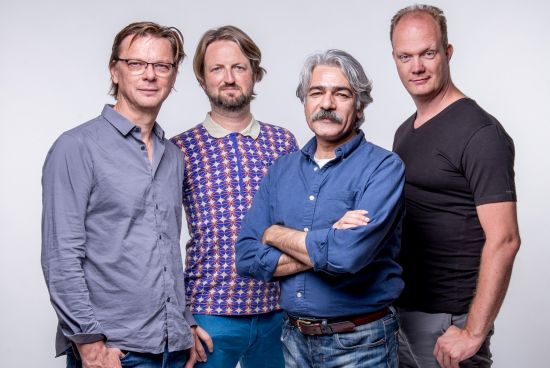|
Kamancheh master Kayhan Kalhor has always been a migratory artist—one who treats boundaries as opportunities for expansion rather than trepidation. It’s Still Autumn stands as one of his most adventurous projects. In unusual yet intuitive combination with Rembrandt Frerichs (fortepiano, harmonium), Tony Overwater (bass viol, double bass), and Vinsent Planjer (whisper kit), he doesn’t so much chart new territory as create it from the Earth’s darkest caverns to its brightest skies. Appropriate, then, that the album should be diurnally sequenced.
The introduction of Dawn opens eyes set in a face of ancient ways. Every line around them, rendered by Kalhor’s bow, is testament to the gratitude of awakening to greet the sun and its blessings with open hands. In this improvisatory space, instruments take on characteristics all their own. Kalhor is a griot of humble means, Frerichs a continental voice from another time, Overwater an anthropologist in search of personal connections, and Planjer a mathematician who finds rhythm in the very air.
Through the photorealistic evocation of “Dew Drops” and the caravan beat of “Kayhan’s Chahar,” the quartet renders moving images of a time that existed long before cameras were around to capture them. Both fortepiano and bass viol prove themselves simpatico companions on a journey that might feel incomplete without them. Their energy here is as spirited as their quietude in “Still,” from the rippling surface of which the kamancheh emerges as a spirit of the water itself, singing in slow motion of its tearful constitution before the proper “Offering” is made.
Dusk falls in a droning lamentation for a past that can never be forgotten. The effect is such that when “Autumn” (an Armenian folk tune) draws a horizon line beyond the plains, it feels like a resurrection of much-needed value. Frerichs’s fortepiano evokes the rounded tone of a santur, and feels very much at home. This blends into a delicately accompanied double bass solo in “Autumn Winds,” wherein time, folded into itself, serves to undo regularity in favor of an open-ended system.
And as the band coalesces into the starry beauty of “Long Story Short,” we begin to understand, if not already, that the music being created isn’t so much exhaled as inhaled, as if it were the incense of a collective consciousness. For while certain pieces have composers’ names attached to them, in their embrace such labels cease to matter, given as they are to the currents of human experience. - Tyran Grillo
|
